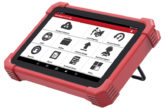
The Institute of the Motor Industry (IMI) has reported 25,000 testers have still not completed their Assessment and risk being suspended from testing, as the 31st March MOT tester Annual Assessment deadline looms.
However, the IMI has applauded the sector as a whole for prioritising the Annual Assessment this year, with the number of compliant testers significantly greater than at the same time last year.
To ease the administrative process of meeting the March deadline, the IMI’s MOT Training and Assessment package has been designed to fit into a tester’s workload. Offering a 3-hour e-Learning training module, it can be completed in bite-size chunks at their convenience.
Importantly, with the DVSA requiring a pass rate of 80%, the IMI MOT Training and Assessment has been designed to give testers a better chance of passing first time. Its question style promotes the effective use of the DVSA MOT Tester Manual, with the result that testers improve their probability of passing the Annual Assessment.
Its e-Learning modules steer testers towards the right parts of the DVSA MOT Tester Manual, aligned to the Annual Assessment topics for 2022/23. The question sets are designed to be intuitive to the topics, with guidance also provided to navigate the manual, and ‘how-to’ videos to help testers through the process.
To offer assistance to MOT testers completing the Annual Assessment in the countdown to the deadline, the IMI has extended its operating hours 30th and 31st March to an 8am start and 7pm close.
Steve Scofield, Head of Business Development at the IMI, said: “Unlike many other industries, where Continuing Professional Development (CPD) might be a mere tick-box exercise, correct training and assessment of technicians is critical to the safety of motoring on UK roads. It’s hugely reassuring to see how many MOT testers prioritised the Annual Assessment this year, completing it well ahead of the deadline.
“However, those MOT testers who fail to meet the deadline of 31stMarch will not be able to legally conduct any MOT work until their training and assessment has been completed. They will also lose the convenience of taking the Annual Assessment remotely. Instead they will have to competently demonstrate to a DVSA representative face-to-face, in their place of work, their ability to carry out an MOT assessment on a vehicle. In short, failing to complete the assessment in time could have serious consequences both for garage income and road safety.”









